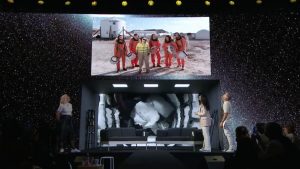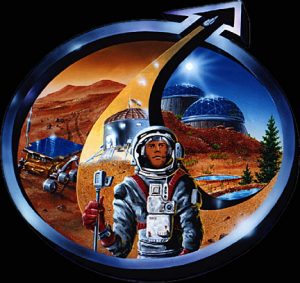What Impact Will We Have On The Martian Environment?

So you might hit the theaters to see that movie where astronauts on Mars catch a Martian bug. They’re dying horrific deaths and can’t return to Earth because it will spread. It’s shades of the worry that the Apollo astronauts might bring back lunar germs and highly unlikely that Martian germs would be able to get a firm grip of human biology (and probably wouldn’t paint black lines across our faces even if they could). But there’s another concern that has been floating around with the debate on whether we should send people to Mars: What effect, if any, will we have on the Martian environment? What if we’re the ones who might introduce microbes that could wipe out any remaining ecosystem on Mars?
Well, we scientific types really should work fast to see if we can discover any remaining life before it gets wipes out by what every healthy human carries around in his or her gut. Besides that, I can’t see too many humans crying if some tiny single-celled organisms get wiped out. I’d be worried if we were to discover any underground sentient life, though. If that happens, we’ll have to keep our distance or it could become the same thing that happened with the Native Americans when Europeans introduced the measles. A disease that one population considers minor could devastate another population.
However, what are we going to do about it? If we completely sterilize our guts before going, pretty soon those bleeding-hearts types will be crying because we starved to death on the way to Mars. Those microbes are simply that important for digestion. The main rule is that we have to be free of any disease that could make our lives miserable or kill us without access to hospitals and their advanced medical care. Not even the people behind sterilizing Mars landers claim that it is possible to completely ensure that the machines we send to Mars are 100% germ-free and some people think that life from Mars could have hitched a ride to Earth on asteroids. I’m not saying that it’s wrong to try to sterilize, because you get better scientific results if you control as many variables as possible. However, between that and the fact that most of us are diligent about washing our hands before meals (Am I right, Aspiring Martians?), I would say that the ones who worry about a disease outbreak on Mars are simply being hypochondriacs.
Of course, considerations of our impact on the Martian environment go beyond germs. Circumstances are going to force us to “go green.” Because no one ever found deposits of oil or natural gas on the Red Planet (not that we’ve ever seriously looked), Mars One is going to use solar power though wind power and nuclear power have also been proposed for a possible Martian colony. Extra power will likely be stored in batteries for seasons when we can’t get a lot of sunlight. Mars One plans to test a new, thinner solar panel that can be rolled up into a compartment as a potential breakthrough in lightweight solar panels.
We are completely going to be into recycling, too. Once we’ve harvested enough water to sustain colonists, we could theoretically recycle it indefinitely through a filtration system and a condensation system that claims extra moisture from the air. Even the water we have to electrolyze into hydrogen and oxygen can be recycled in the sense that carbon dioxide can be broken down through both the plants we will grow for food and through an air filtration unit. We’re also going to be recycling solid waste to use as fertilizer. If we use 3D printers (and why not?), we could theoretically render old broken parts down into their raw materials, and then form those materials into new spools. That means less need to dirty up the Martian environment for new raw materials and a landfill. Mars One touts this as giving a high-profile boost to recycling though it is simply a matter of practicality to use highly efficient recycling methods for our colony.
Mars One will base its protection of the Martian environment on the advice of members of COSPAR panels such as Dr. Chris McKay of the panel on exploration and Dr. John D. Rummel of the panel of planetary protection. Really, the best way to keep Earth from contaminating the Martian environment is to simply not send anything, not even robots. Since that is not an option and we ARE going to have an impact on the environment, it’s okay to take reasonable steps to make sure we don’t do anything irreversible as long as it doesn’t endanger the success of the mission. It’s possible to be so minimalist that we’re basically starving with chronic power shortages. That might make for good TV but the ones who are questioning Mars One’s ethics in the first place will be howling over it. So we’ll be going green (or red, if you like) out of sheer practicality so that we can make maximum use out of our resources.
A COSPAR Report on the Martian Environment









